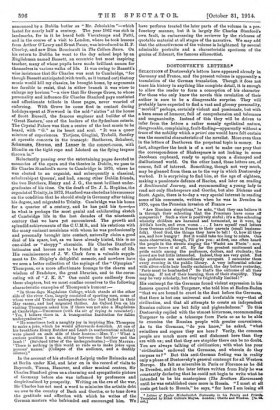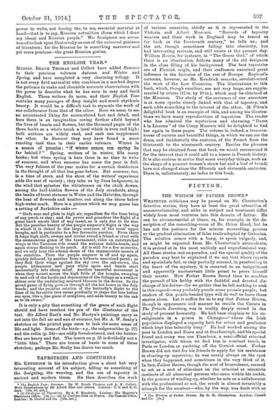DOSTOEVSKY'S LETTERS.* SELECTION! of Dostoevsky's letters have appeared already in
Germany and France, and the present volume is apparently a translation of the German translation. Though it does not trace his history in anything like complete detail, it is enough to allow the reader to form a conception of his character For those who only know the novels this revelation of their author is sure to be a disagreeable surprise. They will probably have expected to find a vast and gloomy personality, " morbid " perhaps, certainly violent and passionate, but with a keen sense of humour, full of comprehension and tolerance and magnanimity. Instead of this they will be driven to infer from the letters a rather meanly egotistical nature, disagreeable, complaining, fault-finding—apparently without a trace of the nobility which a priori one would have felt certain was the essential characteristic of the novelist. More even than in the letters of Beethoven the perpetual topic is money. In fact, altogether the book is of a sort to make one pray that the correspondence of Shakespeare is not lurking in some Jacobean cupboard, ready to spring upon a dismayed and disillusioned world. On the other hand, these letters are, of course, full of interest. Something, though not very much, may be gleaned from them as to the way in which Dostoevsky worked. It is surprising to find him, at the age of eighteen, making a passionate defence of Racine, and later on reading A Sentimental .Tourney, and recommending a young lady to read not only Shakespeare and Goethe, but also Dickens and
Scott. Again, there is to-day a very special interest in reading some of his comments, written when he was in Dresden in 1870, upon the Prussian invasion of France :- "Are Russians simpletons," he asks, "that they can believe it is through their schooling that the Prussians have come off conquerors ? Such a view is positively sinful : it's a fine schooling whereby children are harassed and tormented, as it were, by Attila's horde, and even worse. . . . I have myself read letters from German soldiers in France to their parents (small business.. folk). Good God, the things they have to tell ! 0, how ill they are, and how hungry ! But it would take too long to relate. One more observation, though, give you: at first, one often heard the people in the streets singing the Wacht am Rhein ' : now, one never hears it at all. By far the greatest excitement and pride exists among the professors, doctors, and students ; the crowd are but little interested. Indeed, they are very quiet. But the professors are extraordinarily arrogant. I encounter them every evening in the public library. A very influential scholar with silver-white hair loudly exclaimed, the day before yesterday, `Paris must be bombarded !' So that's the outcome of all their learning. If not of their learning, then of their stupidity. They may be very scholarly, but they're frightfully limited!"
His contempt for the Germans found violent expression in his famous quarrel with Turgenev, who told him at Baden-Baden "that we are bound to crawl in the dust before the Germans, that there is but one universal and irrefutable way—that of civilization, and that all attempts to create an independent Russian culture are but folly and pigheadedness." To this Dostoevsky replied with the utmost bitterness, recommending
Turgenev to order a telescope from Paris so as to be able to examine the Russian people with greater convenience.
As to the Germans, "do you know," he asked, "what swindlers and rogues they are here P Verily, the common
people are much more evil and dishonest here than they are with us ; and that they are stupider there can be no doubt.
You are always talking of civilization; with what has your 'civilization' endowed the Germans, and wherein do they surpass us P" But this anti-German feeling was in reality only a phase of Dostoevsky's general contempt for all Western Europe. He felt as miserable in Paris or Florence as he did in Dresden, and in the later letters written from Italy he was
constantly declaring that he could not begin to write what he intended to be his masterpiece (The Brothera Saramazov)
until he was established once more in Russia. "I must at all costs get back to Russia," he says, "for here I am losing all • Letters of Fyodor Michailovitch Dostoevsky to his Family and Friends. Translated by Ethel Colburn Mayne. London; Ghetto and Windua. [7a. 6. net.]
power to write, not having the, to me, essential material at hand—that is to say, Russian actualities (from which I draw my ideas) and Russian people." We foreigners are accus- tomed to look upon Dostoevsky as one of the universal geniuses of literature; for the Russian he is something narrower and yet more precious—the great Russian genius.



































 Previous page
Previous page